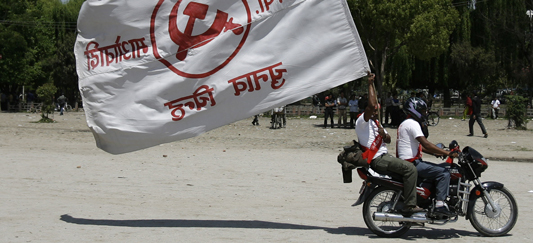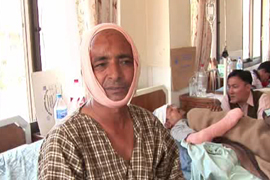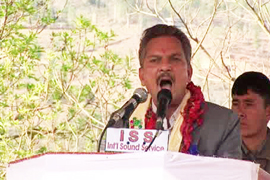
Nepal’s Maoists go mainstream
People & Power finds doubts remain over former rebels ahead of elections.
 |
| Nepal’s former rebels will be participating in elections for the first time [AFP] |
People & Power’s Aloke Devichand visited the Nepalese capital Kathmandu ahead of elections on April 10 and found the country’s former Maoist rebels are attracting all the attention – by fair means or foul.
Nepal’s former Maoist rebels have laid down their arms and are preparing for elections as a mainstream political party.
Men and women who once topped the state’s most wanted list are now being given protection by the army and police as they travel round the country waging a new battle. The battle for people’s votes.
The Maoists carried out a decade-long armed campaign to turn Nepal into a communist republic that left more than 12,000 people dead.
However in 2005 the Maoists found a common cause with Nepal’s mainstream political parties when the monarch seized absolute power.
They united behind a mass movement which forced King Gyanendra to restore parliament the following year. A ceasefire was agreed soon after, bringing the Maoist’s into the political mainstream and possibly ushering in the end of the country’s monarchy.
| People & Power |
Addressing supporters at an election rally the party’s deputy head and chief ideologue, Dr Baburam Bhattarai, believes that they are on course for a decisive victory.
“The elections are another form of war. Our fight is still not finished, we’ve just changed the way we fight,” he tells the crowd.
“We’ll do very well in the elections,” he later tells Al Jazeera. “The old political forces will be wiped out.”
History of violence
In their mission to create a new Nepal the Maoists are striving for change from the bottom up and grassroots activists are a key component.
Shiva Adhakari, a university lecturer, has been canvassing for his local Maoist candidate in an area where residents have little access to running water.
“Maoists are coming from struggle. They are coming from war,” he says. “So the Maoists can solve the problem.”
Their rebel roots may be a source of encouragement for their supporters, but others fear that the Maoists have not really broken with their violent past.
In recent weeks reports of Maoist cadres attacking members of other parties have appeared in local media.
Ram Adhikari was attacked, along with 4 other members of his United Marxist Leninist Party (UML), when campaigning door to door.
“Suddenly 100 people with the wood sticks came up to us. They carry the Maoist flag,” he tells Al Jazeera. “They told us this is a Maoists area. They said we don’t have any right to ask people to vote for us in this area.
“Then they beat us all very badly. I couldn’t move and then I fainted.”
Youth league
Much of the recent violence has been blamed on a faction of the Maoist party called the Youth Communist League (YCL) that leaders of the other political parties say is trying to sabotage their campaigns.
 |
| Ram Adhikari says he was attacked by people carrying the Maoist flag |
“They want to intimidate the voters; they want to create terror in the mind of the election campaigners,” Mahdav Nepal, the head of the ULP says.
“It is not a youth organisation – it is a paramilitary organisation – which should not be allowed to operate.”
The United Nations is also concerned about the YCL’s conduct.
“After the Maoist army was restricted to cantonments, they established the YCL including people who had previously been in the Maoist army and the larger militia that they had,” Ian Martin, the head of the UN mission in Nepal, says.
“Although they maintain that was to operate as the legitimate youth wing of a political party, the YCL have certainly been responsible for some of the incidents during the election campaign and beforehand that have involved violence and intimidation.”
Bhattarai and the rest of the Maoist leadership deny such allegations and claim that their members are in fact the victims of violence and aggression.
“Our YCL are very dedicated and disciplined cadres … they are working for the welfare of the people and there is no question of intimidating anybody, that’s not true at all,” he says.
“If you look at the right report, in the last month 10 of our cadres have been killed by the opposition parties and the government forces. And they are not reported in the so called mainstream media.”
As part of the peace process, the Maoists agreed to dismantle the “people’s courts” which then ran in areas they controlled.
But YCL units have continued to enforce their own justice system.
“There were people exporting rare natural resources for their own benefit. We as the YCL have succeeded in exposing them to the public,” Prem Bahadur Lama – or Comrade 3P as he is called within the party – tells Al Jazeera at a YCL meeting in the hills surrounding the Nepalese capital Kathmandu.
“We warn them several times before taking actions. If their attitude doesn’t change, we don’t kill them but we inflict a different kind of punishment.”
Critics say that this is a system of rough justice, which denies people any form of trial.
The YCL recently imprisoned a Katmandu business man for a week, accusing him of conning three customers. He agreed to speak to People & Power on the condition his identity was disguised.
“They punched me a few times and also asked me to take off my clothes to search my body. Under this pressure, I signed the [confession] paper but then they insisted I repay the money as well,” he says.
 |
| Bhattarai says the Maoists are transforming Nepal |
Maoist leaders such as Bhattarai claim a parallel justice system is necessary during the current phase of Nepal’s development and that they are helping the state because there is a power vacuum at a local level.
However some political observers say that the Maoists’ continued use of violence and intimidation is harming their campaign.
“They have already decided to denounce the violence. Now they need to really practice this in ground reality,” Arjun Kumar Karki, the president of the federation of Nepali NGOs, says.
Bhattarai insists it is Nepal that needs to change, not the Maoists.
“We have brought our revolution change in society. The monarchy is going to be abolished – a 250-year-old institution,” he says.
New groups
“I’m sure we’re playing a leader role in making that transformation. So where is the question of us being transformed? We are not being transformed; we are transforming the whole state and society.”
However there are fears in Kathmandu and elsewhere that the Maoists may return to violent means if they fail at the ballot box.
The party’s leadership has already warned of “consequences” if they perceive the vote to have been rigged.
Such rhetoric unnerves the other political parties and even if the Maoists respect the peace process, other armed groups are waiting in the wings.
The Madhesis make up a third of Nepal’s population and many feel marginalised by the state to the extent where several groups have taken up arms in the Terai province claiming to be fighting for Madhesi rights.
Nepal’s new government will need to ensure these groups do not gain the support of the masses. Analysts say in order to do this it must learn lessons from the past.
“If you look at root cause of Maoist insurgency … the reason people joined the Maoist movement is nothing to do with philosophy or politics,” Karki says.
“The real issues for them were poverty, injustice and unequal social relationship and if we fail to address this there could be another uprising, another armed rebellion.”
Watch part one of this episode of People & Power
Watch part two of this episode of People & Power
This episode of People & Power airs from Sunday, April 6, 2008 at the following times GMT:
Sunday: 14:30 Monday: 01:30, 13:30 Tuesday: 06:30, 20:30
To contact us click on ‘Send your feedback’ at the top of the page
Watch Al Jazeera English programmes on YouTube
Join our debates on the Your Views page
